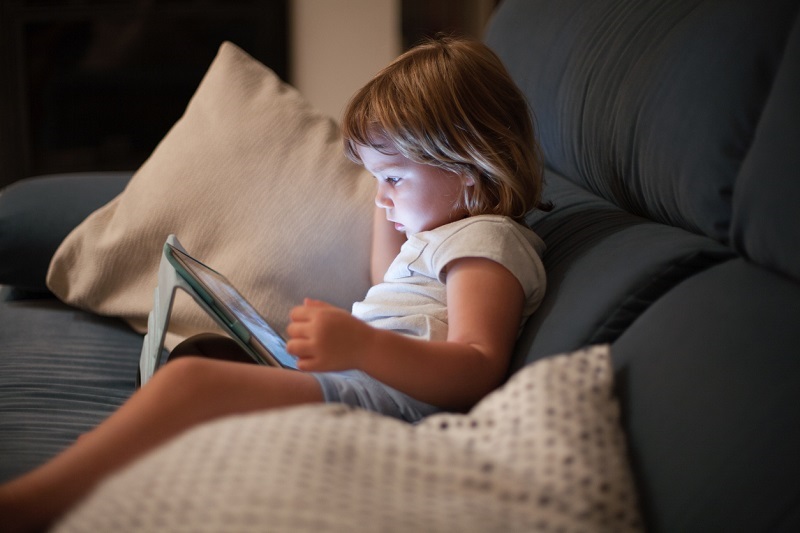Screen Time & Developmental Delays: How Much TV is Okay?

September 11, 2023
You see it everywhere – kids on cell phones, watching tablets, or glued to the TV. It’s almost impossible to be screen-less, but how is all this screen time affecting our children?
A recent study found that children exposed to more screen time at the age of one, showed developmental delays in communication and problem solving by ages two and four.
Developmental behavioral pediatrician, Aseel Al-Jadiri, M.D. explains how much screen time is okay, and what parents should be focused on to create healthy relationships in this screen-filled world.
How much screen time is okay?
The American Academy of Pediatrics recommends:
- Younger than 18 months: limited screen time to video chatting along with an adult
- Ages 2 to 5: Limit non-educational screen time to about one to two hours a day
- Ages 6 and beyond: There is no set amount of time, but it is recommended to still limit screen time and develop healthy relationships with screens
“Most of your brain development happens in those early years,” says Dr. Al-Jadiri. “The biggest problem is when screen time is passive – you want to try and encourage reciprocal interactions, like play and communication. For very young children under two, seeing a grandparent on FaceTime where they’re singing to them, or talking to them, that’s okay, as long as it’s interactive”
“In my practice, I’ve seen children who become dependent on screens all day long, and they can’t separate themselves from their phones/devices,” she explains. “Trying to turn the phone off causes meltdowns, aggression, or dysregulation.”
What happens in early development that screen time can impact?
A child’s development is two fold – innate (what they are born with) and environmental (their experiences.)
“It’s found that children that are well-nurtured develop better because they are exposed to more,” Dr. Al-Jadiri explains. “So children who have parents who talk to them, read to them, play, and expose them to different experiences, have better development than children who do not have access to these things.”
Less social interaction and increased screen time can lead to communication delays.
- Social interaction is a key factor in a child’s development.
- Face-to-face interaction teaches babies how to read faces and develop social skills.
“Nothing can replace human interaction – children learn from those around them, how to play, socialize, and how to communicate,” says Dr. Al-Jadiri. “You don’t need a lot of toys, use things around you to entertain your child and most importantly spend good quality time giving your full attention with all your kids to ensure healthy development and communication.”
Does it matter what my child watches on TV or a phone?
“For young children, the biggest problem is when screen time is passive,” says Dr. Al-Jadiri. “ We want them to actively engage in the content. Watching interactive educational videos like Sesame Street, or singing along and dancing to music”.
Some signs to watch out for during and after screen time include:
- Hypnotized state; unresponsive to the content they are watching, and to what’s around them
- Lack of physical activity
- Difficulty regulating emotions; (with the understanding that toddlers are learning how to regulate, but exposure to screen time may lead to more aggressive behavior or anxiety)
- Sleep problems
- Inability to focus
- Language delays
Also make sure that shows are age appropriate – unsupervised screen time can expose children to harmful content, like violence, bullying or sexual content. If you can’t pre-screen the content, there are online resources available that rank and review content for appropriate ages.
How can parents create healthy relationships with screens?
- Pay attention to the amount of time your child spends with a screen.
- Be a role model for your child. Put down your phone and disconnect from screens. Set device-free times like during dinner or bath time.
- Be mindful of how they are engaging with that content. Are they singing along? Are they repeating the words back? You want your child to engage with the content, not zone out into a trance.
- Watch alongside them. Talk about what you’re seeing and connect about what’s happening in the program. Just being alongside them and spending that time together can make an impact.
“As a parent I understand, that life happens – if your child had an eventful day at their nursery school, learning, being around peers and they’re exhausted, or you need to get something done around the house, or a minute to relax, screen time can be used appropriately,” says Dr. Al-Jadiri. “Just do your best to use screens sparingly, and if you have concerns about your child’s development, don’t wait – reach out to your child’s pediatrician.”
Next Steps & Resources:
- Meet our source: Aseel Al-Jadiri, M.D.
- To make an appointment with a physician near you, call 800-822-8905 or visit our website.
- Learn more about pediatric development care at Hackensack Meridian Health
The material provided through HealthU is intended to be used as general information only and should not replace the advice of your physician. Always consult your physician for individual care.






